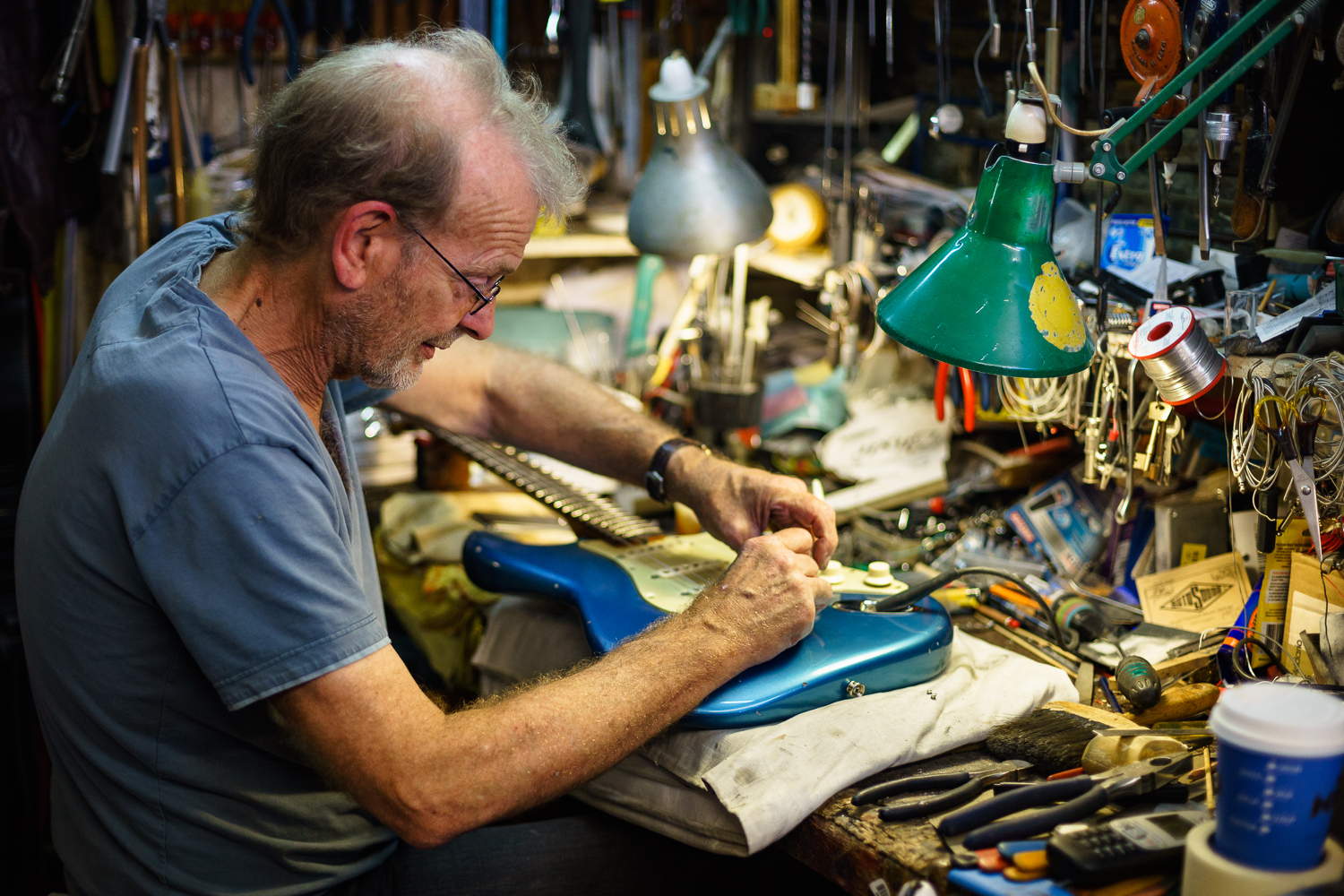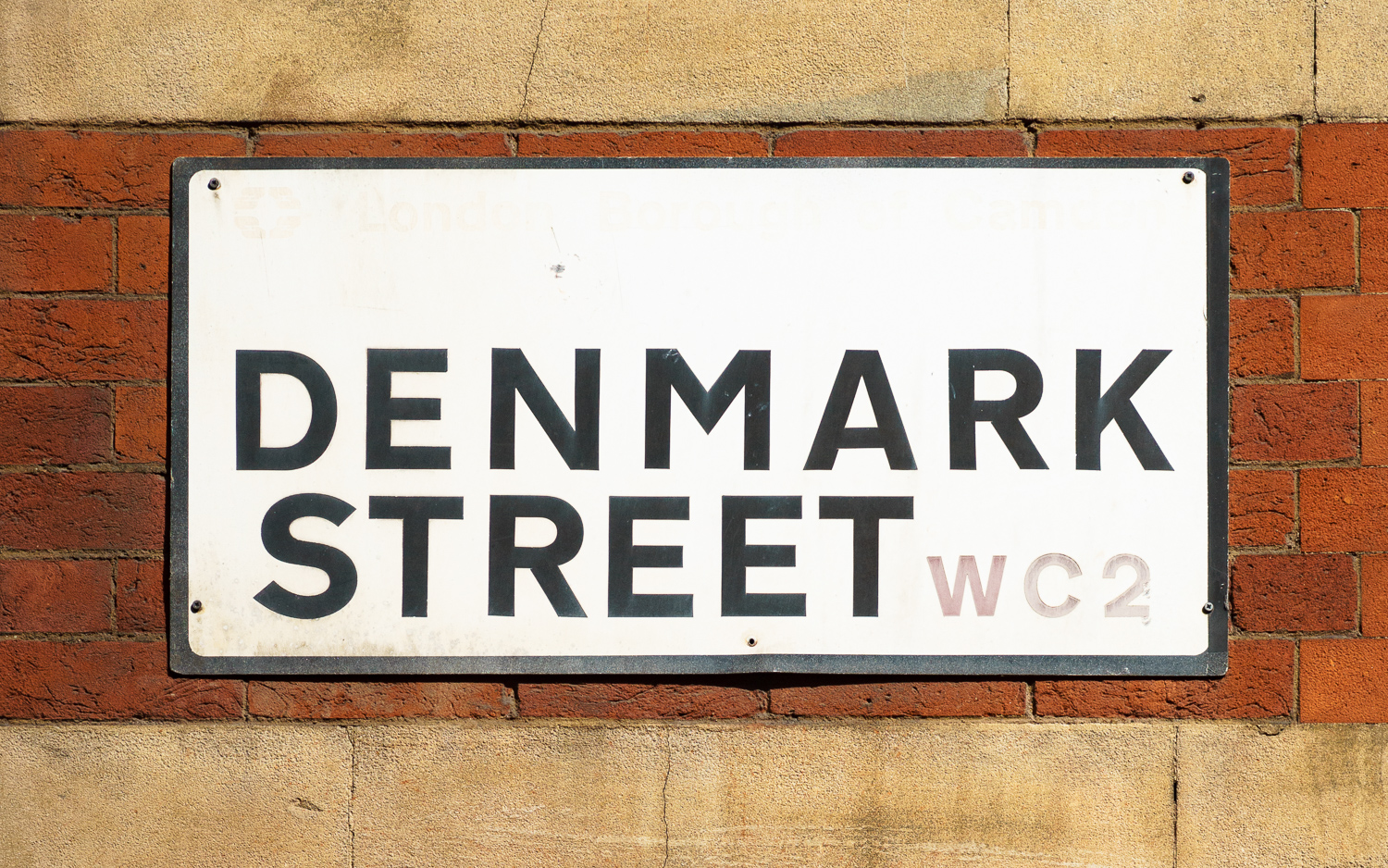Street Stories: Graham Noden, Noden Guitars

Graham Noden is talking on the phone with a customer when I arrive in his small guitar workshop in the basement of Hank’s Guitars on Denmark Street.
A twelve-string Rickenbacker rests on the bench in front of him, its sunburst finish lit up by an anglepoise lamp that has clearly seen better days; a bent piece of metal has been fashioned to hold the bulb socket and switch in place where its top is missing.

Outside, it is the hottest July day ever on record. Down here, under the fluorescents, it is surprisingly and refreshingly cool.
Graham is explaining patiently that, yes, he can convert a guitar to a floating bridge with tailpiece, but that it will make the guitar more difficult to keep in tune.
Has the customer considered the effect on its resale value? The guitar will be worth less after the bridge has been changed.
Firmly, he recounts the ways that manufacturers substitute different parts to keep the factory lines going when they run short. How, despite modern mass production, each guitar may be slightly different to the next one in the shop.
The specification in the maker’s catalogue is then just a guide that cannot be relied upon. The only way to check how easily the work could be done would be for Graham to get the guitar in his hands and measure everything.

I take in the clutter of the workshop: tools, guitars in cases, guitars in parts, parts for guitars, a violin hanging from the ceiling. Amongst the Fenders and Gibsons is what looks like a wooden-backed South American charango.
Somewhat incongruously, a Thomas The Tank Engine clock sits on the wall above Graham’s bench.
Eventually, he finishes his call.
“Is it sunny outside?” he asks.
I tell him the sky has clouded over a little, making it slightly cooler than it was earlier in the day.
“Great! Let’s go and see some daylight.”

I went to the London College of Furniture in 1971 to do a course in electronic music.
I had inadvertently lied my way into the college. I knew so little about electronics that I didn’t realise I was lying. After the first term, it became blindingly obvious that I hadn’t a clue what was going on and transferred to the guitar making course.I sat in there for a couple of weeks till there was an Easter or Whit break, bought some wood and over the two week break made a guitar.
I have to be one of the luckiest people going. At seventeen found what I could naturally do. How many people ever find that? I don’t know, but I did at seventeen.

I worked out in the sticks for a decade, going broke.
One thing they didn’t give us any information on was the fun aspect of how you go about being in business, but I worked for various London shops on and off. In ’83, while going broke, I saw an advert for a repairer wanted in what was then Andy’s. I’ve been there ever since.
When I got to Andy’s they had a lot going for them. They had the work and they had Mal and Fiona Miles. Just simply two of the best people you could work alongside.
They also had a reputation that stank. I mean seriously, because of the things that the repairers other than Mal and Fiona were doing.
It took us ten years to get rid of that reputation and the amount of work that the three of us gave away…
You could tell someone that had been before and didn’t know where else to go. So we learned who had a bad experience before and we gave tons of stuff away to convince people that now you can get good work.

By the later 80s Andy went to the wall for the first time, and because he owed me so much money the business became mine rather than pay me back. Then we ran it for a year as if it were still the shop to make sure they had enough money to survive, which of course meant he owed me even more money. Then it did become mine and he still owes me money, if he ever reads this.
Then he went bankrupt another two times, which is of course not possible, and isn’t around any more. Not in Denmark Street, anyway.
[I’ve] always been in the basement. I love it down there. It’s dry. You know it isn’t raining when people come in who aren’t all wet. [laughs] If you need sunlight and daylight forget it, but apparently I don’t.

I love all guitars. I don’t like them all, but I do love them all. I can’t see a guitar without thinking I can make it better.
[My] favourites are the ones the owners like. If the owner doesn’t like the guitar, what’s the point? If they genuinely only own the instrument because they own it, well, let’s make it saleable and get rid of it mate. Get something they do like and then I can make them happy.
Cause they already like [it] enough, that when it then plays beautifully and we get the sounds they want from that instrument, then they love the guitar.
That’s what it’s all about, not whether I like it, because there’s lots of guitars I think are rubbish.
In 1960 for a hundred and fifty quid you could buy a guitar and go out and make a living as a professional musician. In 2015, for a hundred and fifty quid you could buy a guitar and make a professional living. So, if you’re looking for an inflation proof business it ain’t one.
There are still people out there who in spite of knowing that the big American companies are manufacturers, secretly think that their Gibson, their Martin, their Fender, is actually one of the hand made ones, which none of them are.

In 2008 I had a heart attack on holiday in Greece, on my birthday, which I love telling to my Greek customers because they only react one way: “You’re still here?”
In case it ever gets that far, a huge thank you to a doctor in Nafplion, a little fishing village, in a hospital there who, with a massive dose of Warfarin and a few goes on the old charge starter, got me going again.
At that point my son came up from where he was doing the same job in Brighton.
He said he never would [become a luthier] and then he did. So now it’s Dombey and Son, which is great.
It’s good to have a family member on board and he’s got a much better attitude to business than I’ve got. He cares about it! [laughs] At all!
He’s a great kid – and a new dad, and I’m a new granddad. I don’t feel that old.

[Denmark Street] is evolving, as is the world, London, humans, everything. It’s just evolving.
It’s the oldest intact street in London, behind the facade, or so I’m told. It has huge history, we have tourists by the gazillion just to look at the damn place and listen to stupid stories about how bands started there before some of the shops were even in existence. I love tourist guides.
It’s like the 12-Bar when the squatters came in cause they were trying to save it from being demolished, which isn’t in the plans. That was a bit of a drag. The tour guides immediately were saying that The Who and Zeppelin had started there! [laughs]. It wasn’t even a club by the time they had retired.
Developers want to do one thing, the council want to do other things and it’s just evolving.

It’s becoming like the whole of this area, more touristy, but I look at it like Soho.
When I came Soho was pretty shitty, pretty sleazy. It wasn’t very safe to walk down at night. ‘Oh, I want to go back to those times.’ Like Hell! Why would I want to risk being mugged or rolled? I’m sorry, I’ve got better things to do. Everything changes.
The alley that runs down the back of the shop: for the first ten years we were picking up the wallets from where the girls had rolled the johns.
For the next ten years you avoided treading on the needles and hoped that the anywhere between five and, at the worst, over a hundred junkies gathered by the entrance to the shop waiting for the deals weren’t going to attack you – at six in the morning when I arrive.
And for the last ten years you avoid treading in anything.
I’m sorry, if it became a nice alley with a shop frontage, it wouldn’t actually upset me. So much rubbish is said about it.
There are things that are changing that I don’t like. My original cafe is now a soft core porn book shop. I miss the café, but they got priced out; it’s Charing Cross Road. They were lovely people.

One of my customers came in yesterday. He’d been talking to another music store owner not in Denmark Street who was telling him as fact that Crossrail would take out all the basements in Denmark Street. They’ve already done the tunnels.
I mean, [when they were digging the tunnels] they took out the electrics, they took out the phone twice. Then the electrics again, then the phone again. But, if you’re going to dig under London, who knows what’s under there? Well, they do, where they put the tunnel, because they drilled through it. [laughs]
For the first five years we always had the smell of a gas leak. About the fifth time they came and dug up the road, they found a gas pipe, still connected, just hammered flat at the end so it was seeping out when the pressure built up. It was on no maps and they reckon it went back at least a hundred years.

Denmark Street is being dug up again, for work on electricity cables. The judder of a pneumatic drill reaches the café on Charing Cross Road where we are drinking our coffees.
Constant, isn’t it? That wonderful noise.
It’s a nuisance, but at least I’m not one of the guys doing the digging and the grinding, so let’s not complain about that one. That must be an awful job in this weather.
I’m lucky and I know it. I really don’t know how many other people find [their vocation] at seventeen, especially if they’ve never done anything before in that field. If I believed in past lives, I’d assume there must be generations of instrument makers in my history, but if there are I’ve never found them. They’re all farmers and nutters from North Wales.

As we head back to the workshop, Graham borrows a light for the cigarette he has been rolling. Old Holborn tobacco with liquorice paper.
He is a man who enjoys making things.


2 Comments
Roy Reed
9th July 2015 at 3:20 pmLovely photos, Rob – and a great story!
telfordBM
4th August 2015 at 10:00 pmDoes he say he knows exactly where to find anything in his workshop?
Like someone we both know….
MX